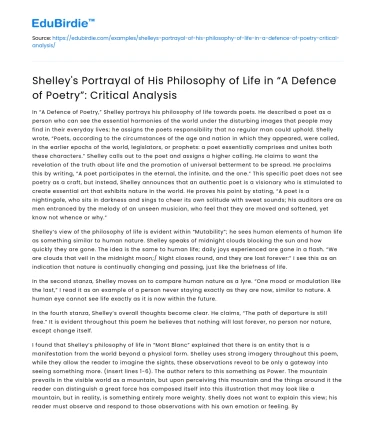In “A Defence of Poetry,” Shelley portrays his philosophy of life towards poets. He described a poet as a person who can see the essential harmonies of the world under the disturbing images that people may find in their everyday lives; he assigns the poets responsibility that no regular man could uphold. Shelly wrote, “Poets, according to the circumstances of the age and nation in which they appeared, were called, in the earlier epochs of the world, legislators, or prophets: a poet essentially comprises and unites both these characters.” Shelley calls out to the poet and assigns a higher calling. He claims to want the revelation of the truth about life and the promotion of universal betterment to be spread. He proclaims this by writing, “A poet participates in the eternal, the infinite, and the one.” This specific poet does not see poetry as a craft, but instead, Shelley announces that an authentic poet is a visionary who is stimulated to create essential art that exhibits nature in the world. He proves his point by stating, “A poet is a nightingale, who sits in darkness and sings to cheer its own solitude with sweet sounds; his auditors are as men entranced by the melody of an unseen musician, who feel that they are moved and softened, yet know not whence or why.”
Shelley’s view of the philosophy of life is evident within “Mutability”; he sees human elements of human life as something similar to human nature. Shelley speaks of midnight clouds blocking the sun and how quickly they are gone. The idea is the same to human life; daily joys experienced are gone in a flash. “We are clouds that veil in the midnight moon;/ Night closes round, and they are lost forever:” I see this as an indication that nature is continually changing and passing, just like the briefness of life.
Save your time!
We can take care of your essay
- Proper editing and formatting
- Free revision, title page, and bibliography
- Flexible prices and money-back guarantee
In the second stanza, Shelley moves on to compare human nature as a lyre. “One mood or modulation like the last,” I read it as an example of a person never staying exactly as they are now, similar to nature. A human eye cannot see life exactly as it is now within the future.
In the fourth stanza, Shelley’s overall thoughts become clear. He claims, “The path of departure is still free.” It is evident throughout this poem he believes that nothing will last forever, no person nor nature, except change itself.
I found that Shelley’s philosophy of life in “Mont Blanc” explained that there is an entity that is a manifestation from the world beyond a physical form. Shelley uses strong imagery throughout this poem, while they allow the reader to imagine the sights, these observations reveal to be only a gateway into seeing something more. (Insert lines 1-6). The author refers to this something as Power. The mountain prevails in the visible world as a mountain, but upon perceiving this mountain and the things around it the reader can distinguish a great force has composed itself into this illustration that may look like a mountain, but in reality, is something entirely more weighty. Shelly does not want to explain this view; his reader must observe and respond to those observations with his own emotion or feeling. By doing this, the reader can gain the ability to see beyond the physical world to the world that lies beneath it (the spiritual world). (Insert 12-17)
The third stanza begins to approach how a person may be affected by having this experience. There is talk of death and dreams, and while given very particular details about the substantial world, those characterizations mold as a bridge towards the spiritual world outlined in the poem. (Insert line 60-61) Shelley’s use of words and language serve as another link between the physical and mental realms. As this stanza concludes, the reader infers that faith in nature and the spiritual world represents strength to overcome the doubt and uncertainty of life. The benefits are of this trust and made manifest as Shelley wrote: “Thou hast a voice, great Mountain, to repeal/ Large codes of fraud and woe;”. Nature ultimately shows to be a positive guiding force based on its intimate connection with the spiritual world, and by putting faith in this trust, one can navigate the uncertainties of life. (Insert line 74-79) (Insert line 80-81)
In the continuing stanzas, the concept is further developed as the Shelley wrote, “All things that move and breathe with toil and sound/ Are born and die; revolve, subside, and swell. / Power dwells apart in its tranquility,”. (Line 94-96) I found that this meant if we do not put our faith in nature, the power associated with the mountain remains in its tranquility, the mountain will endure well beyond our mortal life spans. Faced with the alternative of the grasp of the instinctive order and finding purity in nature and the world around us; or exsisting in uncertainty and consequently arriving at the equivalent certain end of life. He seems to say that it is not enough for someone to see the world to be indeed be able to connect with the spiritual world. (Inset Line (142-144) Shelley seems to have a philosophy that there is a connection with nature and the spiritual world appears to offer a cordial difference to distrust and anxiety when one considers that either passage directs to the same outcome.






 Stuck on your essay?
Stuck on your essay?

